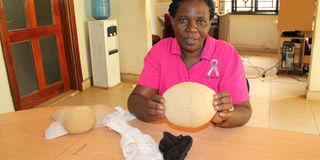Okello makes artificial breasts for cancer survivors

Prostheses. Margret Okello demonstrates how the artificial breast is used. PHOTO BY KELVIN ATUHAIRE
What you need to know:
- Birth of idea. After completing cancer treatment in 2007, a woman from Nigeria gave Margret Okello an artificial breast, but she was challenged because she needed two, and that was how she came up with the idea of making them, Pauline Bangirana writes.
Margret Okello is a very jolly woman and at first encounter, she is welcoming and charming. Okello is married with five children and a breast cancer survivor of 12 years.
Okello shares that when she completed the breast cancer treatment in 2007, she realised that there was a gap in awareness about breast cancer and counselling of patients with breast cancer.
When she had her breasts removed after treatment, she wondered what she was going to do. Luckily for her, she was given two artificial breasts as a donation but with time, they donation was no more and she was wondering what she was going to do next because she needed two and not just one.
“It was a challenge for me because I was wondering what I was going to use considering that I needed two prostheses,” Okello shares.
She recalls that a certain lady from Nigeria gave her an artificial prosthesis and she was challenged because she needed two. It is then that Okello made a decision that she needed to have an alternative to use so that she would feel good and confident about herself.
Okello shares that after treatment; especially for breast cancer survivors, one feels less of a woman without the other breast or both. There is great need for breast cancer survivors to find something to use as an alternative.
This is because when some return home and the chest is unbalanced, they are looked at differently. The need for an affordable and user friendly option is what pioneered the making of the artificial prosthesis for women so that as one is walking on the streets or in the village, they are not discriminated against or judged harshly.
The prostheses help them look and feel like a woman without feeling the gap of the missing breast.
As such, the Cancer Aid Organisation (CAO) pioneered the making of artificial breasts (prostheses) that were given to survivors and there was great feedback. Okello says she too is using them although the start was trial and error.
When you meet her, you will not tell that she is using prostheses and yet with a smile, Okello shares that she is using them and they are light and user-friendly.
The prostheses are made with a pocket/ cover that can be washed in case of over sweating and the cover replaced.
“We made various samples before settling for what we are using right now although there is room for improvement as far as shape is concerned,” Okello says.
She further shares with a smile that the satisfaction she derives from seeing women feeling restored, happy and feeling wholeness is unexplainable, especially to other survivors who are in turn helped to cope positively.
Okello says: “When something restores you to your wholeness and builds your self-esteem, then it does not matter anymore because they feel better.”
Okello explains that she no longer uses certain bras because she needs something that holds the prostheses and shows no cleavage thus the need of a full bra.
Having used the imported prostheses, Okello shares that she realised a need for an alternative because with time, there was an inconsistence in their availability and yet one needs to use them daily.
As she elaborates, she notes that the imported ones are delicate and can easily get damaged or disintegrate and the gel leaks and once damaged, it has to be discarded.
On challenges that they are facing, Okello says the survivors upcountry cannot afford the prostheses and yet her dream is to see every breast cancer survivor receive a replacement immediately.
They are working towards acquiring more machines so that they can create a cottage industry for breast cancer survivors. “We want to equip them with knowledge so that they can earn some money and make a living for themselves,” she says.
Okello says they want to be able to export the prostheses to the Democratic Republic of Congo, Rwanda, Tanzania and South Sudan, among others. Each prosthesis costs Shs35,000.
What beneficiary says
Elsie Luswata is a breast cancer survivor who is now using the prostheses made by Okello.
Luswata shares that she discovered that she had breast cancer in 2014. She found a lump in her breast in October 2014, although she was reluctant to go the hospital.
However, in December of the same year, she decided to seek medical help and that is when she was told that she had breast cancer. Luswata confesses that when she was informed, a lot was running through her mind but she was connected by a colleague to Okello who counselled her.
In 2015, after undergoing treatment, she lost her breast and started using a prosthesis.
At first she was using the imported ones which she says were heavy on the chest and they kept shifting.
“These ones are much lighter, comfortable and very affordable,” Luswata says. Luswata shares that ever since she underwent the cancer treatment, she is not as strong as she was or even quick as she used to be.
“To you the reader, if you ever learn that someone is a cancer survivor, always be patient with them because the treatment takes a heavy toll on the body due to the strong treatment they undergo.”




